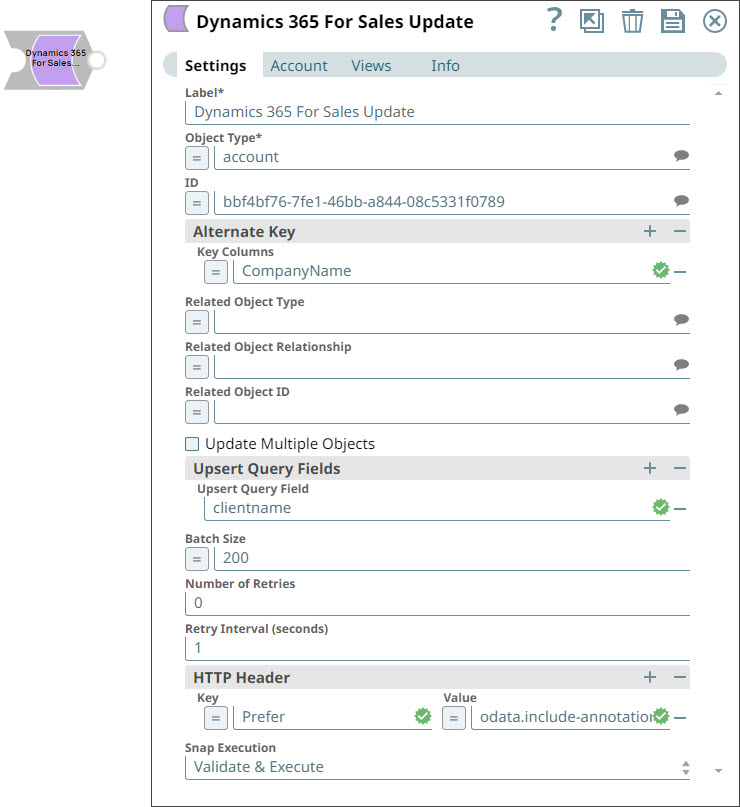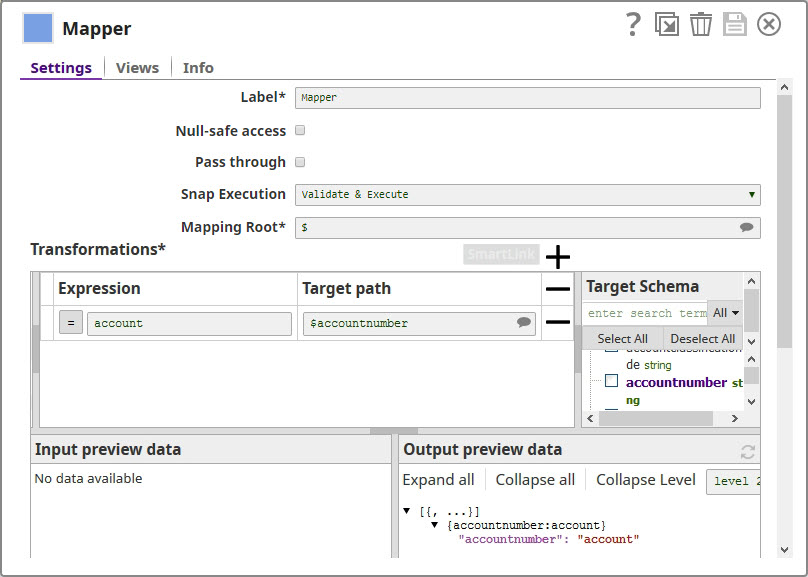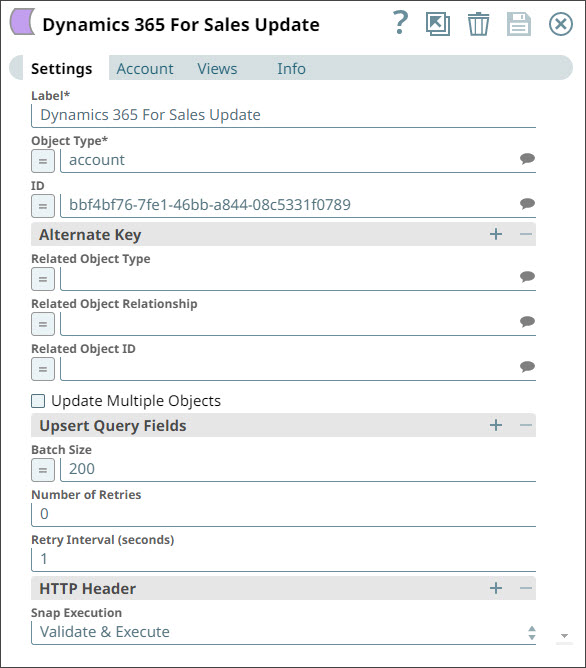On this Page
| Table of Contents | ||||
|---|---|---|---|---|
|
Overview
This Snap provides functionality to update an existing record in MS Dynamics 365 for Sales.
ETL Transformations & Data Flow
This Snap enables the following ETL operations/flows:
- Extract data from the upstream Snap containing the data for updating MS Dynamics 365 for Sales object(s).
- Transform the input document into a SnapLogic friendly JSON Document.
- Load the data into the Dynamics 365 for Sales Update Snap to update MS Dynamics 365 for Sales object(s).
Input & Output
- Expected upstream Snaps: Any Snap, such as the Mapper Snap, that offers a document view as output.
- Expected downstream Snaps: None
- Input: Needs to have an upstream Snap that contains the mandatory fields for updating the existing MS Dynamics 365 for Sales object. Mapper Snap is a preferred upstream Snap as it populates the input schema for the selected MS Dynamics 365 for Sales Object Type.
- Output: A document with the result set. If the update is successful, then the output document will contains the GUID of the updated MS Dynamics 365 for Sales object.
Prerequisites
You must have a Dynamics 365 OAuth2 for Online account, data to query, and access to the objects concerned.
Configuring Accounts
This Snap uses account references created on the Accounts page of SnapLogic Manager to handle access to this endpoint. See Configuring Dynamics 365 for Sales Accounts for information on setting up this type of account.
Configuring Views
Input | This Snap has at most one document input view. |
|---|---|
| Output | This Snap has exactly one document output view. |
| Error | This Snap has at most one document error view. |
Troubleshooting
For troubleshooting purpose, try performing a similar operation directly on the MS Dynamics 365 for Sales console and collect the necessary data. Compare the data used in the user interface with the SnapLogic pipelines to see if there are any inconsistencies.
Limitations and Known Issues
- When deleting more than one object in batches, the Batch Size range is from 1 to 1000. This is a limitation by Microsoft Dynamics 365 for Sales.
- MS Dynamics 365 for Sales limits the number of API calls to 60,000 per minute, per user org. This should be considered, when configuring the size of any batch process.
- The Object Type suggestions are limited to the object types available within the MS Dynamics 365 For Sales v8.2 and v9.0. There is no current ability to suggest custom object types.
This Snap cannot create relationships using collection-valued navigation properties, such as contact_customer_accounts, due to current WebAPI limitations; however, it works correctly with single-valued navigation properties, such as primarycontactid.
Modes
- Ultra Pipelines: Works in Ultra Pipelines.
Snap Settings
| Label | Required. The name for the Snap. Modify this to be more specific, especially if there are more than one of the same Snap in the pipeline. | ||||||||||||
|---|---|---|---|---|---|---|---|---|---|---|---|---|---|
| Object type | Required. The MS Dynamics 365 for Sales object type. You can either enter the name of the object type in this field, or you can select it from the drop-down list displayed when you click the Suggest button. Example: account. Default Value: account | ||||||||||||
| ID | Optional. Specify the Guid of the Dynamics CRM Object. Default Value: None | ||||||||||||
| Alternate Keys | Use this field set to configure columns to use as the alternate key for entities. | ||||||||||||
Key Columns | Specify a name for the column to use in an alternate key. Default Value: N/A
Learn more about Configuring Alternate Keys in MS Dynamics 365 For Sales (Power Apps) . | ||||||||||||
| Related object type | The object type of the related object. Default Value: None | ||||||||||||
| Related object relationship | Relationship between the objects that must be updated.
Default Value: None | ||||||||||||
| Related object ID | GUID of the related MS Dynamics 365 for Sales object. Default Value: None | ||||||||||||
| Upsert Multiple Objects | Optional. Select this checkbox to update multiple records per object type if the query returns more than one CRM record. Default Value: Deselected | ||||||||||||
| Upsert Query Fields | Use this fieldset to include the query fields. | ||||||||||||
| Upsert Query Field | Specify the query fields to use to upsert the corresponding CRM records. Default value: None | ||||||||||||
| Batch Size | Required. Number of records processed in each request. Batch size range is from 1 to 1000. Default Value: 200 | ||||||||||||
| Number of Retries | Specify the maximum number of retry attempts in case of failure (if 0, retries are disabled).attempts to be made to receive a response. The request is terminated if the attempts do not result in a response. Default Value: 0 | ||||||||||||
| Retry Intervals (seconds) | Amount of time, in seconds, between retry attempts.Specify the time interval between two successive retry requests. A retry happens only when the previous attempt resulted in an exception. Default Value: 1 | ||||||||||||
| HTTP header | Additional HTTP headers to pass when sending requests to the Dynamics 365 for Sales instance. Example:
Default value: No default value | ||||||||||||
|
|
Example
Using the Dynamics 365 for Sales Update Snap to Update an Object
Basic use case: Using the Update Snap to update an object, using update details from an upstream Mapper Snap.
| Expand | ||
|---|---|---|
| ||
The following pipeline demonstrates how you can use the Dynamics 365 for Sales Update Snap to update an object using a Mapper to provide the update information. We add a Mapper Snap to the pipeline, and use the Snap to provide the change we want to update. In this example, we change the attribute 'accountnumber' to 'account'. We now add an Dynamics 365 for Sales Update Snap and select the object whose details we want to update: Save your changes and execute the pipeline. For a successful execution, you should see a confirmation output as displayed below: |
Downloads
| Multiexcerpt include macro | ||||
|---|---|---|---|---|
|
| Attachments | ||
|---|---|---|
|
| Insert excerpt | ||||||
|---|---|---|---|---|---|---|
|



